
My train departed for Udaipur right around 11PM; as a testament to the tourist draw of "the most romantic city in Rajasthan," there were 3 other westerners (all travelling independentally) sharing my 6-berth section; unfortunately, they were all potheads (actually, this probably characterizes about 97% of all visitors to India) and spent the whole morning lighting up.
The old town of Udaipur is centered around the picturesque Lake Pichola which holds a number of islands as well as the grand Hotel Lake Palace. The narrow streets are plagued with western-oriented cafes, tour operators and massage parlours. The town's main attraction is the City Palace which houses a large museum that is largely elephant-centric; there's a large collection of artwork dedicated to elephant wrestling and a model of a general's war elephant, which due to budgetary constraints, was actually just a horse with a cloth nose attached. All through the halls there were ads akin to Rock City or South of the Border that announced an upcoming opportunity to "See the elephant god Ganesha;" these all led to a giftshop where you could buy Ganesha banks, Ganesha bobble-head dolls and every other conceivable piece of Ganesha-related paraphenelia.
Every single restaurant in the tourist district has adapted the "rooftop dining" gimmick, and thus, whenever you wish to look at a menu, it's necessary to scale about six flights of stairs. When out searching for lunch, I got sick of this after the 3rd or 4th place and decided to venture out into the wild, untamed Indian part of town. I was soon lost in a maze of alleys and bazaars, but eventually ran across a huge billboard advertising a massive thali plate for a rock-bottom price; with all the crap America takes about its all-you-can-eat buffets, these thalis are far worse - back home, you have to make a conscious decision to get up, walk over, and grab another plateful, but here, you practically have to resort to violence to stop them from refilling your plate - and you lose that all-too-critical "effort of standing" indicator if new portions are simply brought straight to your seat.
Fortunately another foreigner happened upon the same restaurant and was able to explain to me where I was. From there, I went up to a fascinating museum which explained all the local crafts as well as an extensive exhibit on puppets from around the world - the American contribution was sock puppets; there was also a highly suggestive puppet show which seemed to greatly offend the majority of the elderly patrons.
While walking through a pleasant garden, I had the misfortune of glancing a mountaintop temple far in the distance; my guidebook had nothing to say about this sadistic construction, but there was never any doubt that I would have to go to that hill and climb it. Several horizontal and one vertical kilometer later, I had an excellent view of the lakes and town; the thing that most struck me though, was the sound - by focusing my attention in one or another direction, I could pick up the songs from a parade, a band recital, and individual voices - all clear and distinct - it felt as if I'd briefly acquired a spider-sense.
Every night of the week, every guesthouse in town plays the movie Octopussy; apparently some little part of the film was made in this town, but where they get the consistent demand to justify this, and how the staff avoids insanity is a mystery to me. I went to a waterfront havali (supposedly an old house) where they put on an impressive music and dance show; the highlights included a self-beheading puppet and a lady who balanced 9 heavy buckets on her head while walking on the blades of swords.
At the end of most encounters with children as well as with some of the more pitiful adults, a request is made for coins from your country's currency to add to their "coin collection." It's not clear to me who carries around coinage from their homeland while travelling abroad, but apparently a non-trivial number hand over quarters, 20 pents pieces or Euro-dimes. For the longest time, I couldn't figure out how they used these to their advantage as I'd never been able to get squat for a coin at a bank, but apparently they ship them all to Rajasthan where kids attempt to trade them back to tourists for rupees; they seem to be pretty wise to the rates and never take my offer of 5 rupee/quarter exchange.
I woke up well before the crack of dawn and grabbed the 6 o'clock bus to Chittorgah; unlike in other parts of Asia, nearly everyone around these parts is asleep at this time and so I managed to get not one but three seats.
The town of Chittor has only one attraction that any guidebook bothers to point out - a huge fort full of palaces and temples overlooking the old town. The moment I stepped off the bus (actually while I was still on the stairs) I was mobbed by a group of around 15 auto-rickshaw drivers; each advertised the merits of his three-hour tour of the fort for the bargain price of 100 rupees (one guy even said 50); since the fort was a fair distance away and a few kilometers in size, getting a ride didn't seem like such a bad idea, but I was starving and decided to find a restaurant to mull it over. Unfortunately, 5 of the guys continued following, sat down with me, and kept trying to differentiate themselves from their identical competition; without ordering anything, I got up and commenced sprinting in the direction of the fort.
Going through town (large parts of which were entirely blue) I came across a parade; this was led by men on horseback in elaborate costumes who were followed by women with buckets on their heads, who were subsequently followed by a general rabble, one member of which was completely naked. Parades seem quite popular in India as I have come across at least one nearly every day of my stay; I have never been able to pick out the purpose of one, but they're rarely more than one or two floats. I think the way these are generally started is something like this: a group of friends is sitting around with nothing to do; one of them says, "Hey, I know what we could do, we could have a parade!"; so, they all get on the phone, grab a few dozen of their closest friends, throw some feathers on a rickshaw, throw a mix tape in the boombox and hit the streets. I suppose this promotes community involvement and is much more constructive than anything my friends and I ever did in our spare time.
Once in the fort, the circuit started with the ruins of an old palace as well as a well-maintained modern palace that doubled as a museum and public school; the curators of the former obviously didn't believe that my 3 rupee admission charge warranted turning on the lights, so I couldn't really see any of the exhibits, but I think it was the usual array of weapons and decomposing stuffed animals.
Down the road at the Tower of Victory, I came across the first snack vendor of the day; as I hadn't eaten anything all morning, I grabbed a cone of bhelpuri and went to see the monuments. As I should have expected, the area was full of monkeys, and after only a few mouthfuls of my breakfast, it was stolen by one of the pesky beasts; I remember a time when I looked forward to seeing wild monkeys, but now that I've seen a few thousand of them, the dirty little thieves are really just becoming something of a nuisance. Shortly after this assault, I was attacked by a woman wielding that forehead paint that doesn't wash off for 3 weeks (probably much longer for your average backpacker); she got her thumb about an inch from my skin before I sharply recoiled and darted from the complex.
It turned out to be remarkably hard to find a rickshaw if you hadn't had the foresight to bring one with you, so I did a lot of walking around the far reaches of the fort. As usual, I was mobbed by the typical array of kids trying to improve their English and irritate foreigners. I eventually got back to the bus station where I scouted out a bus to Bundhi; I soon discovered that there was no such bus for 6 hours, and with no clue as to what else there was to do in town, I quickly revised my schedule for the next week and jumped on one to Ajmer leaving 15 minutes later.
From this heavily-trafficked town, I immediately grabbed a ride down the road to the quiet tourist hub of Pushkar which is the home of the world-famous Camel Fair (which I missed by two weeks). I arrived here around 9PM, but was immediately impressed by the number of all-you-can-eat buffets scattered around (I had not yet come across one in India). The Lonely Planet had recommended one of these a few years back, and there were now 4 places bearing the exact same name; I can't say for sure whether I ate at the original or an imitation, but it had a great selection including hummus, falafel, mashed potatoes, spaghetti, donuts, and even a few Indian dishes, all for only 50 rupees.
I had followed a tout to my guesthouse, which had a tagline of "We're not in the Lonely Planet"; there also didn't seem to be any signs or any public knowledge of its existence; as a result, when I tried to return to my bed at 11 o'clock, I found myself wandering a number of dark alleys where the only inhabitants were vigilant dogs and wandering cows. Unlike anywhere else I've visited in India, many streets of Pushkar are completely deserted for good chunks of the day, and even if you're running on a parallel alley within a few meters of the main tourist district, you can go for some time without seeing anyone. I did run across a lively party where people banged drums and danced excitedly well into the night; this was a pre-wedding celebration that apparently continued for the next four days; I was invited to join in the dancing, but I have enough trouble with that sort of thing back home and didn't want to attempt something that probably had strong religious foundations; I was certain that my hotel would be immediately adjacent to this raucous event, but I searched for another 45 minutes, narrowly escaping more than a few dog attacks, before running into it.
Pushkar is an odd phenomenon: it remains a major destination for both foreign and domestic travellers, even though the consumption of alcohol, drugs and meat is forbidden, and the main attraction (outside of the Camel Fair) would seem to be holy bathing areas; I'm not sure who deemed that this would interest tourists, but I was not particularly inclined to sit around and watch people wash themselves. Almost without exception, every local who greets you during your stay tries to give you a flower; these are for throwing in the lake, and once you've done this, a hefty fee is assessed; visitors have started to grow wise to these schemes, so some devious persons will actually hide a flower in their palm, try to shake your hand, and charge you for the incidental exchange.
At one of the baths, there was a group of poor musician children selling their instruments and asking for donations for their expert renditions of Frere Jacques and other hits; I happened to be carting around a big bag of dates and decided to give them each one; this was a mistake as they instantly started hounding me for more; one of them followed me for several kilometers, becoming my guide and personal bard - we worked together to compose a ballad detailing my heroic deeds - it wasn't the best piece, but since I was only paying him in dates, I figured I couldn't expect too much.
I was directed to a mountain on the outskirts of town with a few hundred stairs leading to the top. The shack-like temple at the summit didn't really merit the effort in itself, but the views more than made up for it. Along the slope was a crowd of camera-stealing monkeys; fortunately, I noticed the mischievous gleam in their eyes just in time to pocket mine.
Back at the base, I ran up to the bus station and got a seat back to Ajmer. The traffic-clogged streets here came as quite a shock after the silent footpaths of Pushkar, but there were plenty of attractions on offer. In the center of town, a Jain temple featured an immense, 2-story, golden city with all sorts of miniature buildings and vehicles, as well as extremely ornate wall panelings. Down the road was an old fort which housed a government museum with the standard array of sculptures, tapestries and inscriptions (a particularly boring feature consisting entirely of ancient writing on rocks which is inevitably included in every Indian museum); the highlight was a sculpture of a Hindu deity which had a chipmunk living inside - it would make funny noises and shake slightly and was no doubt highly revered by the faithful.
Deep in the main bazaar, a mosque, which houses a Muslim saint, and attracts more pilgrims than any other in India, was overrun with a few thousand devotees. There was a requirement that your head be covered before entering the complex and there were naturally a herd of hat-salesman standing right outside the gates; I, however, wouldn't have been carrying around a bag full of dirty laundry if I had planned to buy a hat every time I wanted to enter a mosque. I walked inside with an orange shirt wrapped around my head; this killed my peripheral vision and I was constantly sideswiping every manner of beggar - perhaps briefs would've been a better choice, but I wasn't sure what they'd think of the legholes. Inside the saint's chamber, a huge mass of people revolved around the room while flowers were randomly thrown into the air and blessings were given; I hastened to get out of this mobscene before anything weird happened, but was conked on the head with a peacock feather as I exited.
Further into the bazaar was the "Two-and-a-half Day Mosque" which reportedly gained its name from its construction time. As you might except from such a rushed job, it had started to fall apart after only 800 years.
Three kilometers further down a footpath that led into the desert and up a steep hill was situated the Tarragah Fort. I started the trek to this attraction with about an hour of daylight left. Along the way, I guy explained to me that it would be extremely dangerous for me to be on the track after dark (though I can't imagine what could go wrong in a sparsely populated, completely unlit community of poor Muslims) but if I could reach the top by sundown, I could take a car back to the base. I started hastily making my way to the top, though I was frequently stopped by people asking inane questions (like how I expected to make in time if I kept conversing with people like them) and making me pose for photo ops. I ran across an Indian-Australian who was also attempting the climb for his first time and tried to accompany me, but something about sprinting up a mountain winded him and I had no choice but to leave him to his fate. I made the ascent in a quarter of the projected time; at the top was an impressive fort as well as a large mosque housing another Muslim saint - here I got a 5-minute tour and some sort of strange blessing, before running out to the road and jumping on a jeep that immediately took me back to town.
I had signed up for an overnight bus to Jaiselmer which was initially quoted to me as leaving at 9 o'clock; over the course of the day, the departure and arrival times were progressively moved back, until finally, I was waiting at a food shack out on the highway 8km south of town at midnight. I had not been there too long before a jeep from Pushkar pulled up and unloaded a horde of westerners who had all been promised a direct, "deluxe" bus to their destination. Upon boarding, we found that the bus was heavily overbooked, and in addition, it was in the habit of picking up random people along the highway for extra fares - as a result, many of the berths (the bus was divided between seats on the bottom and bunks on the top) were being shared, the cab had about 10 people in addition to the driver, and there was a long line of blanketed forms lining the aisle. I had a non-reclining backseat and was freezing most of the night due to all the broken windows.
We arrived at the terminus to a sight was that was a bit too much for our groggy states; hotel touts all stood in a line holding signs for their respective establishments and each tourist-type would be mobbed by about 6 screaming men the second he/she stepped off the bus (actually there were a number of plants riding our bus that had been trying to convince us to stay at their places for much of the morning); I eventually followed a guy advertising a camel safari, which succeeded in making the others stop following me - from there, it was easy to speedily reject the program and get on with exploring town.
Jaisalmer is nothing short of amazing; it is as if the desert had been molded into a huge, ridiculously intricate sand castle. Every alley is lined with old houses bearing exceptionally detailed designs and a few mansions allow you to walk around inside to see the work up close as well as snap photos of the surrounding city. The central fort houses an expensive museum, which holds little more than a massive stamp collection, as well as several large temples, palaces and other imaginative edifices; it is truly a living museum, as hundreds of people live and work inside and most of the upper tier of hotels and restaurants are located there. Down the hill from the fort is a pleasant lake and a folklore museum which features exhibits on how to ornament your camel and filter opium.
Every second where I wasn't frantically touring the town's attractions, I was surveying the options for camel safaris. There was a wide range of lengths and values, from the 50 rupee/day trips where they just sold you drugs the whole time, to the all-inclusive 450 rupee/day trip with extravagant feasts, princely camping arrangements, and all-you-can-drink bottled water. I wussed out and signed up for a half-day trip, which despite its 300 rupee price tag, turned out to be all-exclusive; we drove one kilometre from town to a temple for which we had to pay admission, then proceeded 40km down the road to a national park full of sand dunes where we again incurred an entry fee; there was some question as to whether the camel was included in my "camel safari", but after some negotiations, I got them to waive the 150 rupee surcharge for my hour ride to the sunset point.
I frankly don't understand why so many people rave about their camel-riding experiences; these beasts are slow, uncooperative and terribly smelly, and riding them for even the smallest interval causes chaffing of a sort that you would really rather not think about. Additionally, the desert is an exceptionally boring place - you can go for hours seeing nothing but sand and the occasional dung beetle; it's really best to be equipped with a jeep capable of 140km/hr rather than a camel averaging about two and a half. We did manage to get these creatures to trot for a short time but this only exascerbates the whole chaffage issue.
I ate dinner at a restaurant where I ordered palak paneer; the waiter didn't want to admit that he had no palak (spinach) so he simply brought me a hot bowl of tomatos, onions and parsely (possibly microwaved Pace salsa) and called it the special "house recipe". I signed up for a sleeper berth on the overnight bus in hopes of sleeping for one or two minutes enroute to the city of Bikaner.
I was in a neat compartment partitioned by glass from the rest of the train; despite this protective bubble, the ride was still plenty bumpy and the window kept getting knocked open. I awoke shortly after 5 and found that the bus was completely empty; I wondered afterwards if I could've just stayed in my warm cubby for a few more hours but my knee-jerk reaction was to jump outside before I got unknowingly relocated to some distant locale. Being in the far west of India's one massive time zone, it takes a while for the sun to come up over Rajasthan; furthermore, the nights are quite cold. Bundling up, I marched off in a direction I believed town to be - the private buses end at a spot just two kilometers from the train station; remarkably, I managed to walk straight through the city centre without realizing it and the next time I did a sanity check, I was 3 kilometers to the south. So I hiked back, returning past all the mangy dogs that had been nipping at my heels along the way.
When I reached the train station, I decided to head 30km south to the 8th wonder of the world - Karni Mata, or the rat temple (I don't know if a place whose only appeal is the thousands of rats scurrying around should qualify for "wonder of the world" status, but it was certainly better than many of the other such 8ths I've run across. Basically how this place works is that you take off your shoes, stand in the middle of the shrine, and hope that rats scurry over your feet - it's especially lucky if the rare white rat makes an appearance; another popular thing to do is eat sweets that have been salivated upon by the rodents - I would've certainly brought a whole bag home if there was any suspicion in my mind that it might make it through customs.
Back in town, I went to the tourist information center; here some guy gave me a map, a few pots of tea, and then he had me roll candle goo into candles (apparently his meditation group can only use candles rolled by foreigners). So an hour passed before I managed to get out of there. By this time I had developed another fever similar to the last (probably from wearing my dirty clothes on my head), and so I quickly modified my plans to skip the blue city of Jodhpur and head straight for the metropolis of Jaipur. Even though a waiting list was taking shape for the following day, 6 hours before departure, there were 48 spots on that night's sleeper train.
A major attraction of the city is a huge fort in the middle containing several palaces and other architectural marvels. They force you to join a tour group where the guide speaks three languages, but the segment of English was only ever about a quarter of the length of the others. There was an old 19th century museum enclosed in the fort (sort of a museum within a museum - definitely need a thorough understanding of quantum physics to grasp). Apart from the fort was an actual modern museum which housed mostly women's dresses and was a serious waste of time and money.
I walked through the old city where I was harassed by little children at every turn. Besides a slew of traditional havalis, there was a thoroughly impressive Jain temple at one end; my guide waited til the other tourists left and let me into the all the secret places where I wasn't supposed to go.
Despite the fact that every man, woman, and child in India seems to have a blanket wrapped around them after sunset, I had the darndest time trying to pick one of these up for myself, so I had to bribe the train's ticket collector to steal a set of linens from one of the upper-class cars. I had a good 11 hours of sleep before the train erupted in utter chaos as all the Jaipurians clambered to get aboard while the Jaipur-bound tried desperately to fight their way off.
This city is known beyond most others as a place for ripping off tourists; as I stepped onto the platform, I was instantly greeted by a line of auto-rickshaw drivers offering to take me to super-cheap hotels. I dodged past these and attempted to negotiate the city on foot. I had the good fortune of finding a church 10 minutes before the morning service started; I found a seat far in the back-corner so that the parishioners could be spared whatever stench I'd acquired from going 4 days without a shower and 2 weeks without washing my pants.
After picking up a room at the standard backpackers haunt and running a full wash in that bucket they use in place of a shower, I set out on the town. I soon came across some kid selling neat little puppets and picked one up for $1 (I later discovered the true price was half this); unfortunately a tout for a textile shop spotted me doing this and decided to make his day's project. I don't know that I've ever come across such a convoluted attempt to get me into a store; first we visited a temple in the old city, then took a bus 3km east to the monkey temple (where hundreds of monkeys converge on a little shack after sunset) and then (some hours later) took another bus 3km north to the shop; this was truly a high-class operation with free sodas and elaborate marketing pitches - sadly, they were expecting me to pay real money for their goods and I was forced to leave empty-handed (aside from an armload of 7-up bottles).
Shopping in India seems to be a much greater effort than most of the other bargain nations; in places like Thailand, Cambodia and Vietnam, they have a hundred shops right next to each other selling exactly the same collection of things; it's a very simple matter to just waltz into a store, name a ridiculously low price, and repeat for subsequent stores, revising the figure up 10 cents each time until someone bites. In Jaipur, the shops are at random places spread over many kilometers, so you can walk a really long way without coming across a repeat of the sort of item you've seen in one place; as a result you have to make your initial bid a little more reasonable - the trouble with this is that the vendor does on the rare occasion accept; at this juncture you're faced with the scary possibility that you could be paying more than the absolute lowest price. Nothing upsets vendors more than naming a price, fighting bitterly to get them down to that price, then revising the bid lower; they're typically not violent people, but this really preturbs them.
In Jaipur it is quite common to have someone come up to you and say something like "why don't you trust Indians?", this is the first part of a script which will continue regardless of your response on to say how all westerners they have met in his city scream epithets at him the moment he says hello. One-hundred percent of these people are touts, who feed on your emotional objections to being labelled as an indiscriminate racist - so a proper response is something along the lines of "Because you're all a bunch of thieving bastards!" This will typically shut him up, if it doesn't, it's best just to kick him in the shins and run for it. In other parts of the country, there's a slew of people who will just converse with you to learn about your culture and language and they're largely trustworthy, but in Jaipur, they're all crooks; decent people learned their lesson a long time ago when the first 100 foreigners they tried to talk to kicked dirt in their face and ran away.
Indians, for all their industriousness, sure love to sleep; even in the big cities, most everything shuts down by 10 and doesn't open til 12 hours later. I blame this on the food; there's no such thing as health-food in this country - everything's slathered with butter and deep-fried or placed in a deep tub of oil - I once had a sandwhich which had six full layers of butter applied to it. I have actually begun eating at MickeyDees as a healthy alternative.
In the morning I ordered a "banana pancake" at the hotel restaurant which was certainly a dosa and had absolutely no pancake aspect about it - it didn't have the fluffiness of a cake, nor did it have the shape of a pan. As crushing a blow as this was, I decided to push on with my day; I went first to the Museum of Indology - this was run out of someone's home and had such oddities as "the world's largest denomination of currency (10 billion deutsche marks)"; the ticket price included a personal guide who didn't speak a word of English - I've never done so much smile-and-nodding in my life. The next stop was the Central Museum, which was housed in an impressive building but had little else of interest - I did get to personally witness a pigeon getting sucked through an exhaust fan, which was mildly entertaining, if not slightly preverse.
Following some intense shopping, I ran up a 2km path (actually much less draining than the shopping) to the Tiger Fort overlooking the city. No one worked at this fort, other than the 5 guys sitting around selling tickets, so it was a bit run-down, but the views were spectacular nonetheless.
The following day I went to the popular Hawa Mahal structure in the old town, reputedly the symbol of the city, and then breezed by the much more interesting park adjacent to it which was full of oversized astronomical instruments - you could climb up giant protractors and scramble over all manner of star-measuring blocks - it was like a big playground for math nerds.
North of town, I came upon an epic construction nestled among the mountains called the Amber Fort; on all sides of that, walls ran up the adjacent hillsides to similar structures which sat at every summit. The forts were filled with random museum pieces, such as the world's largest wheeled cannon, and offered superb views over the city and surrounding planes. One thing you notice looking over Jaipur, which may set it apart from most every other city in the world, is the kites; on every rooftop, a kid steers his or her small craft through the sky, and these all combine to form a flurry of activity in the air - unnoticeable in a casual glance, but after a moment's gaze, you come to realize the hundred distinct objects that flutter in the breeze.
I was sick of the city by 4 in the afternoon and didn't feel like waiting for the midnight train, so I jumped on a bus to Delhi. This arrived at around 11 in some random part of town that was fortunately only mildly distant from the backpacker's area. I grabbed an overpriced room in one of the few hotels whose reception was still going at this time. After about an hour, I realized that I was feeling a bit overly feverish and decided to find a hospital; the owner gladly pointed me in the direction of one but not before charging me the full amount for the night.
My auto-rickshaw driver dropped me off at a children's hospital and his utter lack of English (besides "20 rupees") made it impossible to move him any further, but after asking inside, I was able to get directions to the place I was seeking half a kilometer down the road. Here the med-student on duty gave me a barrage of medications (including a rather painful injection in the butt) to treat each of the symptoms I had rattled off. I returned to my hotel a bit unsatisfied, but slept for a few hours before heading back to the same hospital for a second opinion.
The second time around, a doctor was intrigued by my condition and decided to admit me for observation. The hospital did not have the best of conditions - dogs wandered the halls and random people slept in piles on the floor. In the wards, the patients were lined up less than a meter apart on beds that either had no linens or were covered in sheets of indeterminable age.
For some reason my tests included an X-Ray and ECG along with the standard assortment of blood samples; after that, "observation" simply entailed taking my temperature every few hours. The food service seemed somewhat lacking as I had only received an orange after being there for some 8 hours and so I decided I must escape to procure some decent food. I made a 2-hour excursion into town to grab a sandwich and a book before returning to whether the night ahead. In the bed next to me was an Indonesian traveller suffering from Hepatitis; he had made it through China, Mongolia, Pakistan, Afghanistan, and 20 other "stans" without getting sick, but he too was shortly defeated by India's overwhelming lack of sanitation. He had initially been apprehensive about staying at the hospital and had questioned the necessity of the X-Ray and other exams he'd been prescribed, but after he learned it was all free, he began to wonder why he had ever bothered paying for food or lodging in India, and investigated what other superfluous tests he could order.
On the afternoon of the second day, we were transported to another ward; here, the Indonesian was used as test patient for a full class of students; I read in another room where a number of exceptionally flatulent people had opted to sit on my bed.
I was a bit surprised when two persons from the US Embassy randomly appeared at my bedside; the hospital had notified them that I was there and they had come to offer me a chance to escape to a cleaner hospital; I opted to take to the streets in hopes of seeing a bit of the capital before I winged back to the western world.
I made a half-hearted attempt to walk around the touristy areas of Delhi before I decided on a full-scale retreat. Running to the international terminal and inquiring into the first flight to the UK, I found I could leave this scary, alien world behind by noon of the same day.



Lake Palace









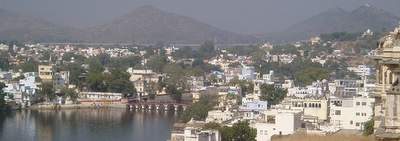







Window-shopping by elephant
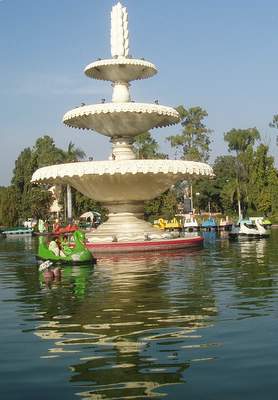

These camels must be about as embarassed as a cat in a sweater

Darn, I knew it was a mistake to buy all that alloyed cash











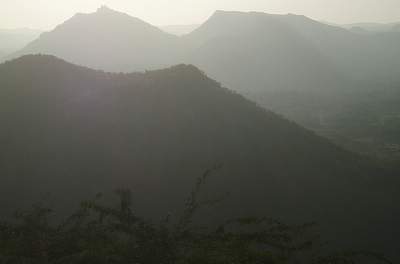





Woman with fire on head
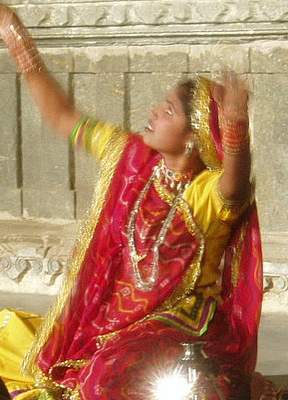



Standing on sword blades while balancing 9 heavy buckets





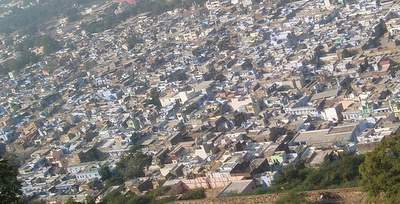






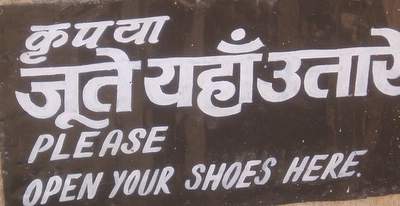

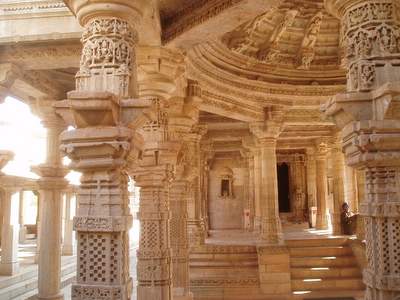




Monkey with my snack





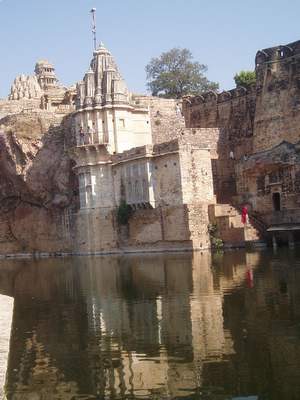






Hog with a hog

It's not English but you can sort of get the gist



Beauty of nature


What is this supposed to be?



A little touch of home overseas








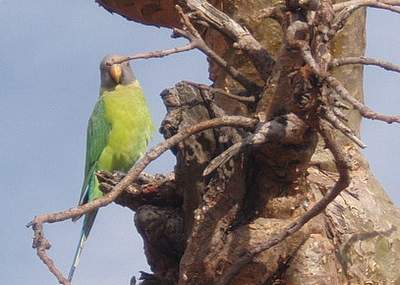

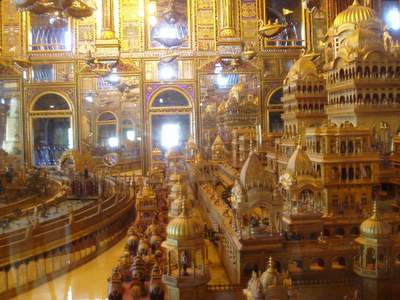










Money pit










Crazy goat































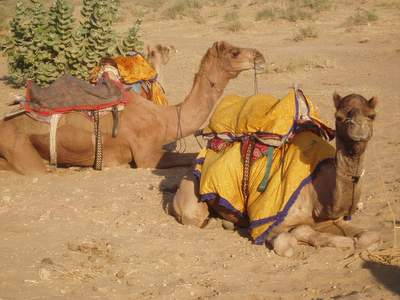











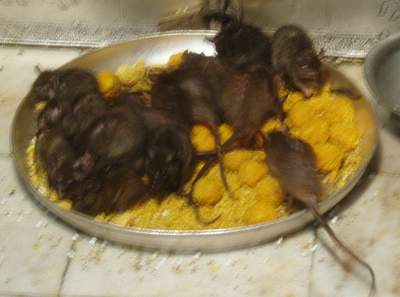
Holy food offering



































"Piccadelhi"